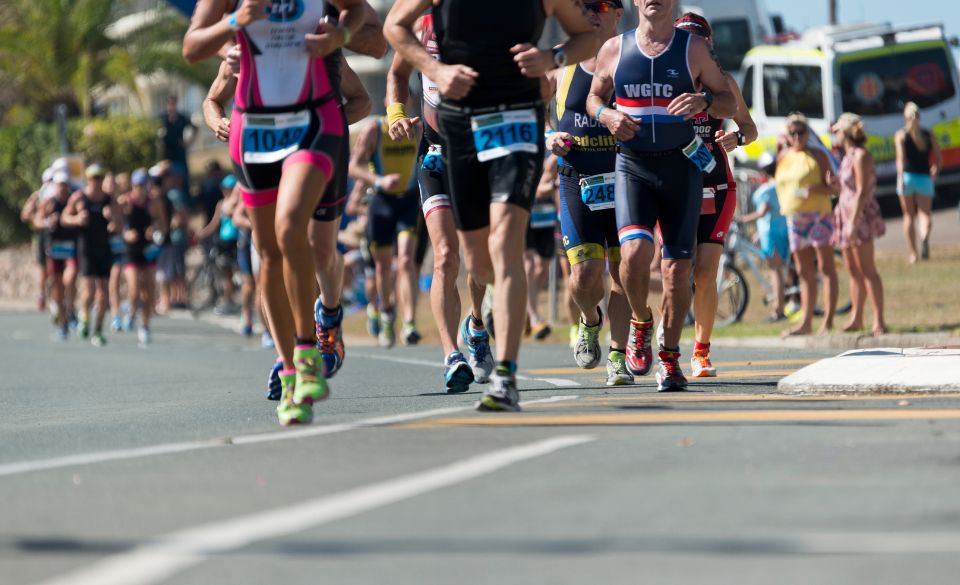
Ironman Triathlon Recovery: How to Bounce Back After the Race
Page Contents
Completing an Ironman triathlon is an incredible accomplishment, but it also takes a significant toll on your body. Proper recovery after the race is essential to help your body heal and prevent injuries. Here are some tips on how to bounce back after the race and get back to training.
Rest and Recovery Time
After finishing an Ironman, it’s essential to take some time off to rest and recover. This means taking a break from training and allowing your body to heal. Experts recommend taking at least two weeks off from any strenuous activity to give your body time to recover fully.
Proper Nutrition
Proper nutrition is critical during recovery after an Ironman. You need to eat a healthy, balanced diet to help your body rebuild and recover. Focus on consuming plenty of lean protein, complex carbohydrates, and healthy fats. Additionally, make sure to hydrate adequately and replenish electrolytes lost during the race.
Gentle Exercise
Although taking a break from training is essential, gentle exercise can help stimulate blood flow and aid in recovery. Activities such as walking, swimming, and gentle yoga can help promote circulation and prevent stiffness and soreness.
Massage and Stretching
Massages and stretching can be beneficial during recovery after an Ironman. Massages can help reduce muscle soreness, improve circulation, and speed up recovery time. Stretching can help increase flexibility and prevent muscle imbalances.
Sleep and Rest
Sleep and rest are crucial for recovery after an Ironman. Aim for at least eight hours of sleep each night and take short naps during the day if needed. Make sure your sleeping environment is comfortable and conducive to a good night’s sleep.
Set Realistic Goals
Once you’ve had time to rest and recover, it’s time to get back into training. However, it’s crucial to set realistic goals and ease back into training slowly. You don’t want to risk injury by pushing yourself too hard too soon. Gradually increase the duration and intensity of your workouts, and listen to your body.
Recovery after an Ironman triathlon is just as important as the training and preparation leading up to the race. Rest and recovery time, proper nutrition, gentle exercise, massage and stretching, sleep and rest, and setting realistic goals are all essential components of the recovery process. By taking the time to recover properly, you can ensure that you’re ready to get back to training and achieve your future goals.
How To Mentally Recovery After a Ironman Triathlon
Completing an Ironman triathlon is a significant physical and mental accomplishment that can leave you feeling exhausted and emotionally drained. Mental recovery is just as important as physical recovery, and taking steps to care for your mental health after the race can help you bounce back more quickly. Here are some tips on how to mentally recover after an Ironman triathlon.
Reflect on Your Accomplishment
Take some time to reflect on what you accomplished during the race. Remember the obstacles you overcame, the training you put in, and the incredible accomplishment of finishing an Ironman. Celebrate your success and be proud of what you achieved.
Give Yourself Time to Rest
After the race, it’s essential to take time to rest and recover. This means taking a break from training and allowing your body and mind to heal. Taking a few days or even a week off from any strenuous activity can help you recover mentally and emotionally.
Set Realistic Goals
Once you’re ready to start training again, set realistic goals for yourself. It’s crucial to have something to work toward, but setting unrealistic goals can leave you feeling discouraged and overwhelmed. Set goals that are challenging but achievable, and break them down into smaller, manageable steps.
Focus on the Positive
During the race, it’s easy to focus on the negative aspects of the experience, such as pain or fatigue. However, after the race, it’s important to focus on the positive. Think about the things you enjoyed during the race, the support you received from friends and family, and the sense of accomplishment you felt when you crossed the finish line.
Practice Self-Care
Taking care of yourself mentally and emotionally is just as important as physical self-care. Make time for activities that bring you joy and help you relax, such as spending time with friends, reading a book, or taking a bubble bath. It’s important to take care of yourself and give yourself time to recharge.
Seek Professional Help
If you’re struggling to recover mentally after an Ironman triathlon, it’s important to seek professional help. A sports psychologist or counselor can help you work through any mental health challenges you may be facing and provide you with strategies to improve your mental well-being.
Mental recovery after an Ironman triathlon is just as important as physical recovery. Reflecting on your accomplishment, giving yourself time to rest, setting realistic goals, focusing on the positive, practicing self-care, and seeking professional help are all essential components of mental recovery. By taking care of yourself mentally and emotionally, you can bounce back more quickly and be ready to take on your next challenge.
How Long Until You Should Start Training For Your Next Ironman
Before starting to train for your next Ironman triathlon, it’s important to take time to recover both physically and mentally. This includes taking at least two weeks off from any strenuous activity to allow your body to heal fully. Depending on how you feel, you may need to take longer.
Evaluating your current fitness level is important before starting to train for your next Ironman. If you’re in good shape and have been consistently training, you may be able to start training for your next race within a few months. However, if you’re starting from a lower fitness level, you may need more time to prepare.
Your goals for your next Ironman will also impact when you should start training. If you’re aiming to beat your previous time or achieve a personal best, you may need more time to prepare. If you’re simply looking to complete the race, you may be able to start training sooner.
Once you’ve evaluated your fitness level and considered your goals, you can start planning your training schedule. Typically, Ironman training programs last between 20 and 30 weeks, depending on your current fitness level and goals. You’ll need to factor in time for building your endurance, strength training, and recovery.
Overall, the timing for starting training for your next Ironman triathlon will depend on various factors, including your physical and mental recovery, fitness level, goals, and training schedule. It’s important to give yourself enough time to prepare so that you can achieve your goals and complete the race safely and successfully.



